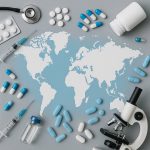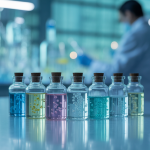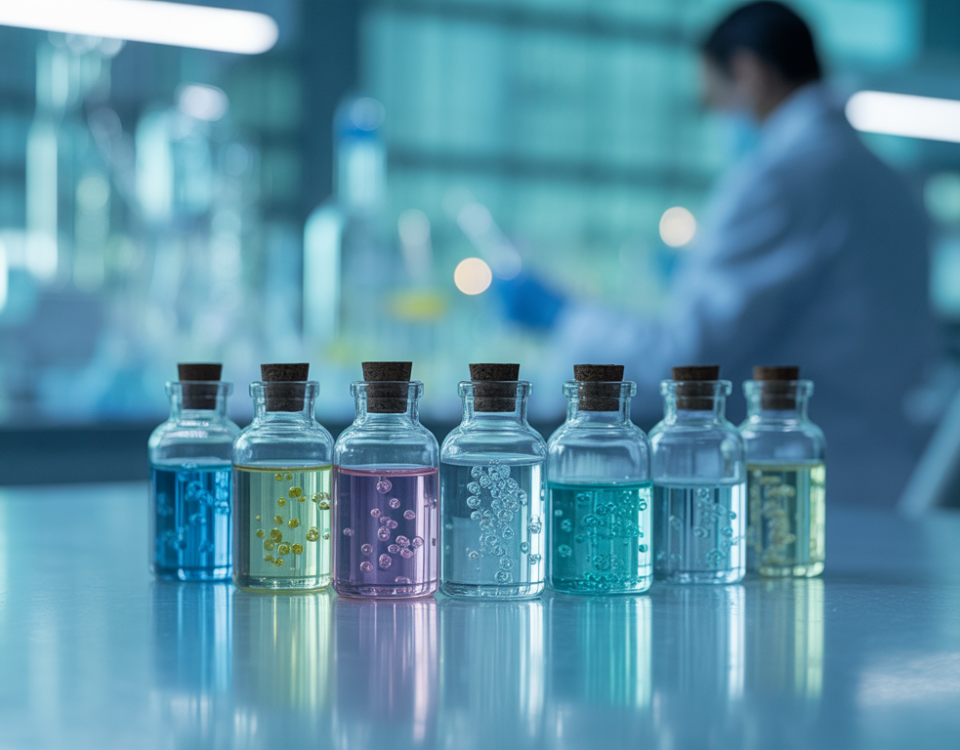
Global Trends in Standardization and Reference Materials
13.07.2025
Another 42 reference materials from NCSS have been recognized in CIS countries.
03.08.2025Many modern laboratories combine multiple functions, offering comprehensive development solutions. Such multifunctional laboratories require highly qualified specialists with broad expertise in one or several areas like chemistry, biology, biotechnology, biochemistry, pharmacology, statistics and IT. No single specialist, however educated, can fully master all these fields.
Specialists who can work at the intersection of disciplines are particularly in demand - for example, chemists with deep IT knowledge or biologists with bioinformatics experience.
Synthetic Chemist
The synthetic chemist is the initial link in the process of developing innovative pharmaceutical drugs. This specialist is engaged in creating new molecules - potential active pharmaceutical ingredients (APIs). They develop synthesis methods, select optimal compound structures to enhance their efficacy and safety, and participate in scaling up the substance production process. A synthetic chemist must possess deep knowledge of organic and medicinal chemistry, as well as synthesis and purification methods.
Working in close collaboration with computational modeling specialists, analytical chemists, and clinical pharmacologists allows for significant savings in time and material resources, minimizing the risk of bringing ineffective or unsafe drugs to the pharmaceutical market.
Digital Success Prediction Specialist
In the pharmaceutical industry, computational modeling specialists are becoming increasingly important. These team members operate at the intersection of chemistry, biology, and IT. Using molecular modeling, artificial intelligence, and bioinformatics methods, they can perform in silico predictions of potential drug targets and candidate molecule binding mechanisms, as well as forecast pharmacokinetics. This work helps steer team efforts in the most promising directions, saving company resources. From hundreds of candidate molecules, computational modeling specialists can help select just a few with the optimal combination of properties for drug development. These professionals require not only programming skills and algorithm knowledge but also solid understanding of chemistry and pharmacology to properly formulate modeling tasks and interpret results.
Pharmaceutical Technologist
Obtaining an effective active ingredient is not enough—it must be transformed into a convenient, stable, and industrially scalable dosage form (tablet, capsule, injectable solution, etc.). This is the task of a pharmaceutical technologist. Their responsibility includes selecting excipients, choosing the most rational technological scheme, configuring equipment, and setting production process parameters.
Such a specialist must have in-depth knowledge of the physicochemical properties of substances, biopharmaceutics, as well as GMP standards. They work closely with synthetic chemists (receiving active pharmaceutical ingredients from them) and analytical pharmacists (verifying quality at every stage of development and scaling). Additionally, the technologist, together with the Qualified Person and the quality assurance department, ensures that the developed process is reproducible and controllable under real production conditions.
Analytical Pharmacist
One of the key specialists in a pharmaceutical laboratory is the analytical pharmacist – they are responsible for quality control of raw materials, intermediates, and finished drug products. Analytical pharmacists are indispensable both in pharmaceutical manufacturing and in research laboratories.
The expert opinion of an analytical pharmacist forms the foundation of a company's pharmaceutical quality assurance system. Such a specialist must have thorough knowledge of modern pharmacopoeial methods, analytical instruments, and regulatory requirements. Today, the job market faces a shortage of experienced analytical pharmacists, making them highly sought-after professionals.
Метролог
Particular attention should be paid to including a qualified metrology specialist in the laboratory staff, especially if the organization is engaged in developing reference materials (RM) for quality control purposes. The development and certification of reference materials are impossible without adhering to the principles of measurement traceability, accuracy, and test reproducibility.
Having such a specialist in the laboratory ensures that all analytical procedures are performed and comply with requirements for reliability and traceability, particularly when test results will be used in compiling registration dossiers or in pharmacovigilance processes.
Qualified Person
The Qualified Person (QP) is a position explicitly required by legislation for pharmaceutical manufacturing companies. This employee bears personal responsibility for the release of each product batch. Their authority includes reviewing all manufacturing process and quality control documentation for the batch. Only after their approval can a medicinal product leave the pharmaceutical facility.
To perform these functions, the specialist must have relevant higher education (most often in pharmacy or chemistry) and sufficient experience, confirmed by periodic certification. Their independence and competence are strictly monitored: regulatory authorities during inspections always verify the QP's qualifications and their presence on staff.
Biostatistician
Any drug development process is supported by experimental data. The correct interpretation of this data determines whether the results will be recognized as reliable and the decisions as justified. The scientific rigor of conclusions is the responsibility of the biostatistician.
This specialist's profound knowledge of mathematical statistics must be combined with an understanding of biology and medicine. The biostatistician works closely with clinical pharmacologists when developing study protocols and with analytical pharmacists when processing preclinical study results. Their task is to distinguish statistically significant drug effects from random variations and artifacts. The biostatistician's role in the team is to guarantee the objectivity and reliability of the obtained results.
Clinical Pharmacologist
When it comes to clinical trials, the clinical pharmacologist plays a pivotal role. While this specialist typically isn't part of a pharmaceutical laboratory's staff in the traditional sense, they closely collaborate with all stakeholders throughout a drug's development lifecycle. This physician-specialist is responsible for the scientific and medical oversight of a drug's clinical trials. The clinical pharmacologist participates in developing trial protocols, determines dosing regimens and administration routes, predicts potential drug interactions and side effects. During clinical studies, they monitor participant safety, analyze pharmacokinetic parameters, and evaluate pharmacodynamic effects.
With their medical training and pharmacological expertise, this specialist serves as a bridge between laboratory science and clinical practice. Working alongside biostatisticians, clinical pharmacologists assess whether the observed drug effects are truly clinically significant for patients. Furthermore, clinical pharmacologists often serve on ethics committees and interact with regulatory agencies.
As we can see, a pharmaceutical laboratory (whether as an independent organization or as part of a pharmaceutical plant) is a complex "organism" where success depends not only on advanced equipment and quality materials but, above all, on its people.
One example of successful integration of specialists from different fields is the "National Center for Reference Materials." The organization's activities focus on two key areas: development of certified reference materials (CRMs) and operation of an analytical laboratory. The staff includes highly qualified technologists and analysts. All employees undergo periodic specialized training and continuing education in Good Practices and metrology. This ensures high-quality services and a comprehensive approach to solving analytical challenges.






Darya Dorofeeva, authorized person of NCSS, explains: What specialists are pharmaceutical laboratories looking for today?